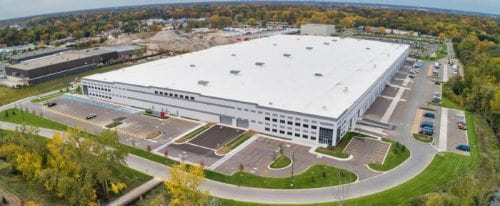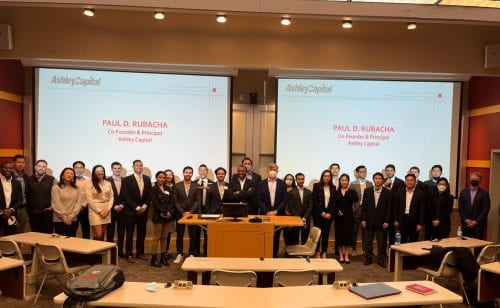

The Baker Program was honored to welcome Paul Rubacha, Chairman of the Cornell Real Estate Council and co-founder and principal of Ashley Capital, to the Distinguished Speaker Series. Mr. Rubacha started his career in the real estate department of Prudential Financial, Inc. and transitioned to equity operations with Goldman Sachs, establishing himself on Wall Street. When discussing his career trajectory, Mr. Rubacha talked about the transition of manufacturing activities from local United States operations to global locations, particularly in Southeast Asia, in the 1980’s. This resulted in empty warehouses as manufacturing operations increasingly moved overseas. Hard-hit states like Ohio, Michigan, Minnesota, and Indiana faced widespread ill-effects as a result, such as unemployment, a depressed regional economy, decline in asset values, distressed landowners, and unused land. This is when Mr. Rubacha and his partner, Rick Morton, identified the opportunity to buy vacant warehouses, upgrade them, and lease them out to provide a better tenant experience.
Mr. Rubacha’s first deal was a warehouse complex located on the far south side of Chicago. This was the opportunity to lead the rehabilitation of an underused site into a desirable and functional warehouse for a top tenant. The existing occupancy was less than 50% because of the site’s location in the Rust Belt, where industrial activities had sharply declined during the 1980’s. Mr. Rubacha realized that the 12 buildings were quite functional with an overall size of 2 million sq.ft., decent sprinkler fittings to prevent fire hazards, and a reasonable docking ratio. He took over most of the assets, bought the remaining two parcels outright, and financed them, using the proceeds to make the necessary upgrades to the entire development. Following the upgrades, the development’s occupancy increased from 50% to 93%. Mr. Rubacha adopted a creative financing approach to use a tax abatement, part of a tax deferral program and achieved great cash flows. This first deal was key in driving subsequent deal flow, as it helped Ashley Capital build a strong rapport with clients, brokers, and local contractors.
Mr. Rubacha shared that the key to becoming a successful developer is putting yourself in challenging situations and using creative problem-solving techniques to deliver the highest return on your portfolio. He was able to recognize the opportunity in buying warehouse properties with a low basis, creating value, and leasing them back at a higher price, while truly delivering results as required by clients. Ashley Capital’s portfolio was originally comprised of existing warehouses that became value-add assets. Today, the portfolio has equal parts existing warehouses and new warehouses constructed from the ground up.
Mr. Rubacha provided great insight into the different types of industrial deals in today’s marketplace, and the challenges associated with each. One value-add deal, also known as a “forward acquisition” deal defined for an asset in either pre-development or under-development, yet to be completed, was for a cross-dock logistics facility in an infill location in Atlanta. This deal had leasing risks, but no construction risks associated. Ashley Capital was able to mitigate the leasing risk using its extensive relationship network with local brokers and contractors. The other type of deal that Mr. Rubacha presented was for the acquisition of a “forward purchase opportunity” defined for a site that is still under construction but had a good preliminary plan approved by the municipality and an estimated timeline of construction. However, there were still construction risks associated with the remaining work on the site, contingency issues, and tenant finish requirements that could not be easily accounted for, making the underwriting process a challenge. The construction risks were mitigated by increasing contingency costs in underwriting.

It was helpful to learn about the major challenges associated with the industrial asset type, especially since it has been such a popular commodity in the capital markets for investors and developers in recent years. There has been an unprecedented demand for industrial assets in the US in the last year, with supply chain strategy changing from “just-in-time” to “just-in-case” and more companies bringing their manufacturing activities back to the US. The top reasons contributing to this shift are the increasing cost of shipping, increasing automation capabilities, the decreasing need for cheap labor, diminishing language barriers, and reduced time zone barriers, all of which have made it less desirable for companies to have their manufacturing operations in Southeast Asia.
It was important to note that not all players engaged in the development and investment of industrial assets will prevail, as Mr. Rubacha noted. Those companies with long-term expertise in industrial assets are better positioned to benefit from sustainable earnings resulting from current market conditions. A great example of this is Ashley Capital’s portfolio increasing in assets under management dramatically since its engagement with Amazon in 2017. Ashley Capital’s experience with the location-dependent site selection process, civil engineering requirements, parking ratio suitability, and their strong relationships with municipalities have led them to complete more than 3.5 million square feet in transactions with Amazon thus far.
In 2016, Ashley Capital sought assistance from the Michigan Economic Development Corporation (MEDC) to turn a long-abandoned racetrack in Hazel Park into warehouses that now house Amazon, LG Electronics, and Bridgewater Interiors. The brownfield tax increment financing program not only helped Ashley Capital build state-of-the-art mixed-use spaces for top tenants, but it also generated interest for future residential and commercial developments in Hazel Park. “Having Ashley Capital redevelop the racetrack has helped attract new restaurants and breweries to consider locating here and contributes to an overall sense of pride for residents and workers in the city of Hazel Park” said Jeff Campbell, community development director of Hazel Park. [1]

The true essence of Mr. Rubacha’s success in real estate investment lies in his opportunistic business strategy and focus on quality. When asked for advice on pursuing a successful career in real estate, he emphasized adopting a “proactive approach” towards the general understanding of markets, asset types, and investment strategies. This will allow the successful investor to derive not only the big picture of the industry but also identify underlying challenges which may bring value-add opportunities.
[1] https://www.michiganbusiness.org/reports-data/success-stories/ashley-capital/
